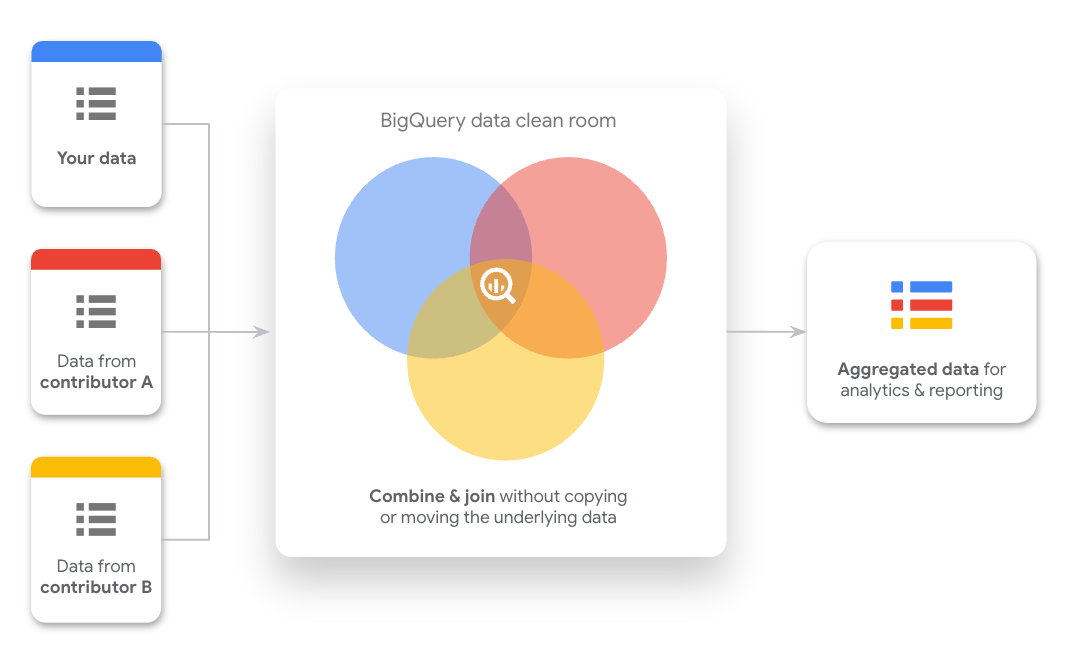BigQuery data clean rooms
Seamlessly create and manage a secure environment for privacy-centric measurement, data sharing, and collaboration across organizations without moving or copying data.
Create your own data clean room in BigQuery in a few clicks.
Overview
What is a data clean room?
According to IAB, a data clean room is a secure collaboration environment which allows two or more participants to leverage data assets for specific, mutually agreed upon uses, while guaranteeing enforcement of strict data access limitations like not revealing or exposing personal data from customers to other parties. DCRs can be designed to serve an array of purposes and deploy different mechanisms, like performing a specific computation for determining matching of audience data between two parties.
Why do organizations need a data clean room?
With growing consumer privacy awareness and expanding privacy regulatory environments, data sharing and collaboration are increasingly complex and risky. The need for secure and privacy-compliant data sharing is particularly acute in the digital advertising and media industry where signal loss is impacting the ability for advertisers to reach their target audience, optimize ad conversion rates, or even accurately measure and report on campaign results.
How to select a data clean room that is right for you?
First, consider the compute capabilities and the ability to scale with the size of your data and for the number of collaborators for the clean room. Next, you should think about how quickly you can get a data clean room set up, how quickly you can run queries, and how quickly you can get value from your clean room. Finally, ensure that your data clean room provider offers the privacy protections that meet the needs of your organization.
What makes BigQuery data clean rooms different?
Benefit from the scale of BigQuery without needing to manage any infrastructure. BigQuery data clean rooms give you the controls to prevent your shared data and your query results from being copied or exported by a subscriber. Access easy-to-use privacy functions like aggregation thresholding and differential privacy to protect your sensitive data before it is shared. Streamline your workflows with data connectors and partner integrations.
How is customer data protected with data clean rooms?
There are several ways data is protected within a clean room. First, data contributors can set privacy policies and analysis rules before making the data available to partners to protect sensitive information. BigQuery data clean rooms will offer cutting-edge data science techniques such as aggregation, differential privacy, and more to anonymize or pseudo-anonymize the data. In addition, BigQuery data clean rooms will enforce export restrictions by default.
Common Uses
Publishers and advertisers
Privacy-preserving data sharing and media optimization
Data clean rooms will make it easier for publishers to share with advertisers valuable data that can help optimize advertising effectiveness. Advertisers can use data clean rooms to target ads more effectively, and publishers can use them to measure effectiveness and provide better insights to their customers. For example, an advertiser that is buying display media can join ad performance to purchase data to understand media effectiveness and allocate media dollars to best-performing networks.
How-tos
Privacy-preserving data sharing and media optimization
Data clean rooms will make it easier for publishers to share with advertisers valuable data that can help optimize advertising effectiveness. Advertisers can use data clean rooms to target ads more effectively, and publishers can use them to measure effectiveness and provide better insights to their customers. For example, an advertiser that is buying display media can join ad performance to purchase data to understand media effectiveness and allocate media dollars to best-performing networks.
Retailers and consumer packaged goods
Bridging the data gap with first-party data
Retailers that sell consumer packaged goods (CPG) products have massive amounts of transaction data, which is valuable for CPG companies that often don't have sales data to show the full customer journey. By combining retailer sales data with CPG first-party data, large brands and manufacturers can allow for improved campaign targeting and segmentation to improve sales. Retailers can also monetize customer data while retaining ownership and customer privacy.
How-tos
Bridging the data gap with first-party data
Retailers that sell consumer packaged goods (CPG) products have massive amounts of transaction data, which is valuable for CPG companies that often don't have sales data to show the full customer journey. By combining retailer sales data with CPG first-party data, large brands and manufacturers can allow for improved campaign targeting and segmentation to improve sales. Retailers can also monetize customer data while retaining ownership and customer privacy.
Internal data sharing
Gain insights across your organization
Organizations with distributed teams can use data clean rooms to power internal data sharing in a privacy-centric manner. Example use cases include working with sensitive employee/HR data or working with sensitive health data.
How-tos
Gain insights across your organization
Organizations with distributed teams can use data clean rooms to power internal data sharing in a privacy-centric manner. Example use cases include working with sensitive employee/HR data or working with sensitive health data.













